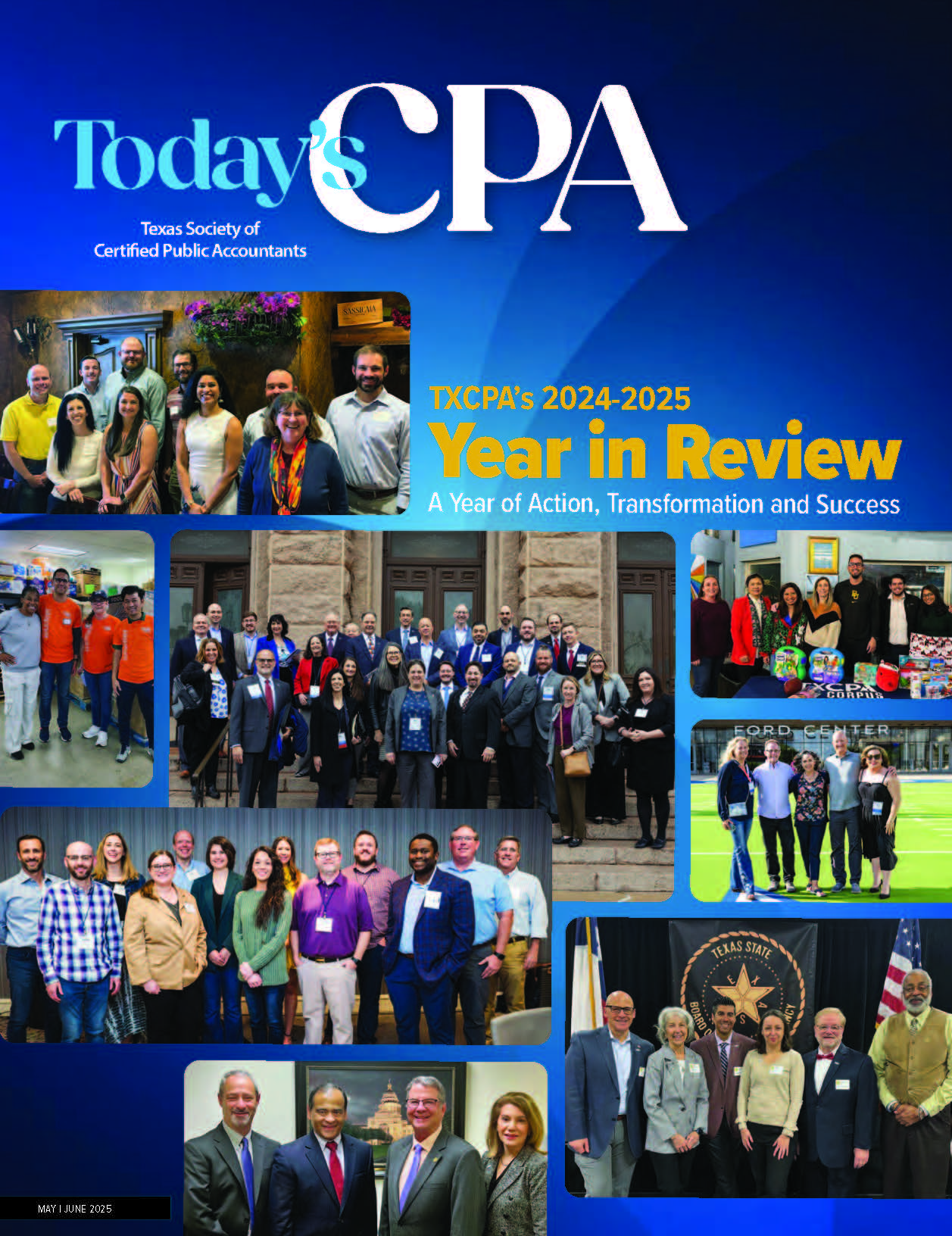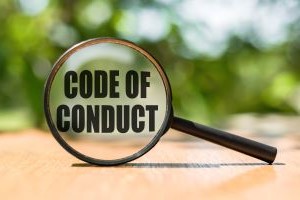May 05, 2025
CPE: The Significance of Codes of Conduct in Professional Organizations - Standards for Ethical Practice
Part 2 of Series
By Steve A. Garner, Ph.D., CPA, CFE
~~ ~~ ~~ ~~ ~~ ~~ ~~ ~~ ~~ ~~ ~~ ~~ ~~ ~~ ~~ ~~ ~~ ~~ ~~ ~~
CPE Self Study Article & Quiz Register to gain access to the self-study quiz and earn one hour of continuing professional education credit by passing the quiz.
~~ ~~ ~~ ~~ ~~ ~~ ~~ ~~ ~~ ~~ ~~ ~~ ~~ ~~ ~~ ~~ ~~ ~~ ~~ ~~
CPE Hours: 1
Curriculum: Ethics and Management
Level: Basic
Designed For: CPAs in industry and public practice
Objectives: To explore the importance of select professional organizations’ codes of conduct
Key Topics: Examine the codes of conduct for the AICPA, ACFE, CFA Institute, and IIA; understanding the commonalities and differences of ethical principles across organizations
Prerequisites: None
Advanced Preparation: None
~~ ~~ ~~ ~~ ~~ ~~ ~~ ~~ ~~ ~~ ~~ ~~ ~~ ~~ ~~ ~~ ~~ ~~ ~~ ~~
Codes of conduct play a vital role not only for companies, but also for professional organizations in providing a framework for ethical behavior. This article explores the importance of select professional organizations’ codes of conduct. Specifically, it details codes of conduct for the American Institute of CPAs (AICPA), the Association of Certified Fraud Examiners (ACFE), the CFA Institute, and the Institute of Internal Auditors (IIA). Key details for each organization’s code are explained with discussions on the similarities and differences between their codes.
Professional Organizations and Their Codes of Conduct
Well-known professional organizations have their own codes of conduct to guide their members. These codes of conduct serve as vital tools for maintaining ethical standards, fostering professional competence, and ensuring that members act in the best interests of their clients and the public. Let's take a look at four prominent examples.
American Institute of CPAs
AICPA, the world's largest member association representing CPAs, has developed a comprehensive Code of Professional Conduct. Key aspects of the AICPA's code include the following.
Principles – The code is based on five fundamental principles: integrity, objectivity, professional competence and due care, confidentiality, and professional behavior.
- Integrity: The CPA should be honest and candid in all professional engagements, ensuring that their work is reliable and free of any intention to mislead.
- Objectivity: The CPA should not show partiality and avoid conflicts of interest in the performance of all professional services. In this regard, independence is particularly important for auditors, as it promotes confidence in the financial statements and ensures that decisions are not based on personal interests or external pressures.
- Professional Competence and Due Care stress that a professional should maintain professional knowledge and skill. CPAs should continually improve their competencies to provide high-quality services. They are committed to performing their responsibilities with due care and in accordance with the standards relevant to the service being rendered.
- Confidentiality implies that information obtained by a CPA from a client should not be disclosed to unauthorized parties without proper authority. This principle ensures that sensitive financial and other proprietary information of clients is not disclosed to unauthorized parties.
- Professional Behavior: CPAs are expected to follow not only the letter but also the spirit of the law and regulations and to refrain from acts that would bring discredit to the profession.
These principles form the foundation of ethical behavior for CPAs.
- Rules: The code outlines specific rules addressing each of the above principles. These rules provide detailed guidance on professional conduct in various scenarios, such as maintaining independence in auditing and preparation of financial statements, conflict of interest, and accuracy of financial reporting.
- Interpretations: AICPA also provides interpretations and ethical rulings that help clarify and apply the principles and rules outlined in the code. These interpretations assist CPAs in navigating complex ethical dilemmas.
Association of Certified Fraud Examiners
The ACFE, an organization dedicated to combating fraud, has a Code of Professional Ethics that guides the conduct of Certified Fraud Examiners (CFEs). Key highlights of the ACFE's code include the following.
Principles – The code is built upon five principles: integrity, objectivity, confidentiality, competency, and professionalism. These principles guide CFEs in their responsibilities, emphasizing the importance of impartiality and ethical decision-making.
- Integrity: Integrity is a cornerstone of the ACFE code. A CFE must be honest and conduct fraud examination matters in an ethical manner. A CFE shall not engage in activities that are misleading, which will adversely affect the fairness and accuracy of the investigations.
- Objectivity: CFEs shall not be biased while conducting fraud examination assignments. Given the sensitive nature of their work, they should avoid conflicts of interest and report findings based on facts and not speculations or biases.
- Confidentiality: CFEs safeguard confidential information. Since privileged or private information is often encountered in work, the CFE shall exercise reasonable caution to maintain the confidences of all parties with whom he/she works, releasing information only when compelled by the requirements of the law or professional responsibility.
- Competency: The requirement of competency in fraud examination is emphasized here. CFEs shall engage in continuing professional education programs that maintain present knowledge in the areas of fraud deterrence, detection and investigation.
- Professionalism: CFEs must discharge their professional responsibilities with due respect, integrity and fairness.
Standards – The code outlines specific standards that CFEs must adhere to, including ethical conduct, professional competence and confidentiality. These standards include upholding the integrity of the profession, maintaining impartiality and safeguarding the rights of individuals during the fraud examination process.
CFA Institute
The CFA Institute, a global association for investment professionals, has a Code of Ethics and Standards of Professional Conduct that governs the behavior of chartered financial analysts (CFAs). Key features of the CFA Institute's code include the following.
Code of Ethics – The code sets forth ethical principles, including integrity, diligence and loyalty, which CFAs should uphold in their professional activities. It emphasizes the fiduciary duty CFAs owe to clients and the importance of maintaining the integrity of the capital markets.
- Integrity: The CFA Institute expects CFAs to be honest and fair in all professional dealings with clients; hence they should not use any professional advantage for personal gain or for obtaining an unfair competitive advantage.
- Diligence and Professionalism: The member must conduct duties with due care, skill and thoroughness. Due diligence should be conducted prior to, but also while, rendering investment recommendations or rendering other types of financial counsel.
- Loyalty plays the most important role in the client-advisor relationship. CFAs are under a fiduciary duty in which they must put their client's interests before their own. The same principle applies in that CFAs will have to adhere to the strict professional conduct principles in terms of conflict of interest.
- Fiduciary Duty of care further explains that CFAs must act in their clients' best interests, offering complete transparency within the investment process and not taking any measures that may harm the financial interest of clients.
Standards of Professional Conduct – The standards provide specific guidelines for CFAs, covering areas such as professional competence and duties to clients and employers. These standards ensure that CFAs act in the best interests of their clients and maintain the highest professional standards.
Institute of Internal Auditors
The IIA, a global professional association for internal auditors, has developed the International Professional Practices Framework (IPPF), which includes the Code of Ethics for internal auditors. Key components of the IIA's code include the following.
Principles – The code is built upon four fundamental principles: integrity, objectivity, confidentiality, and competency. These principles provide a framework for internal auditors to fulfill their professional responsibilities and maintain the trust of stakeholders.
- Integrity: Internal auditors shall perform their work with honesty, transparency and ethical conduct. It is important to retain stakeholder confidence and ensure the internal audit activity is reliable and credible.
- Objectivity: Internal auditors shall remain independent and impartial in their evaluations. Because internal auditors assess an organization's governance and risk management processes, it is essential they provide unbiased recommendations.
- Confidentiality: It emphasizes the safety of personal information received during the auditing process. This requires that internal auditors not disclose proprietary information, unless otherwise legally demanded or authorized.
- Competency: It highlights that internal auditors should have the professional proficiency to perform the tasks assigned to them. Continuous learning and professional development are very critical in the ability of auditors to be competent in handling complex audit tasks and emerging risks.
Rules of Conduct – The code outlines specific rules of conduct that internal auditors must follow, including independence, professional competence and confidentiality. These rules ensure the highest level of ethical conduct in internal auditing.
Commonalities of Ethical Principles Across Organizations
The codes of conduct share a range of common ethical principles that form the foundation of professional integrity within their respective fields. While the areas of concentration differ, these organizations converge on several key aspects of ensuring trust, accountability and transparency.
Integrity as Core Principle – The most striking similarity among all four codes is integrity. All these organizations believe that integrity is the core principle on which the bedrock of all professional practices is laid. Whether it is in the financial, auditing, fraud examination, or investment sectors, professionals are expected to act with honesty, fairness and transparency in all their engagements.
For example, AICPA’s code underscores the importance of integrity in maintaining public trust, requiring CPAs to provide honest and accurate financial reporting. Also, in the case of the ACFE, CFEs should execute fraud examinations with the highest degree of integrity, ensuring that their findings are based on facts rather than personal opinions. The CFA Institute, likewise, highlights the importance of integrity in maintaining client confidence and market protection, whereas the IIA’s code highlights the role of integrity in ensuring that internal audits are credible and trustworthy.
The same underlying emphasis on integrity would mean there is a common professional duty to maintain ethical behavior since it is the foundation of public trust in each of these professions.
Objectivity and Independence – The second most important area of concurrence of these codes is that of objectivity and independence. All the codes necessitate that professionals be impartial and try to avoid any situations that could result in conflicts of interest that might affect their judgment. In professions where veracity and truthfulness of data are critical, objectivity ensures that decisions and recommendations are based solely on evidence and facts.
Codes of various professional bodies demand that their members undertake certain etiquette. For instance, AICPA’s code requires that an auditor be independent of a client to preserve credibility on their financial audits. Similarly, the ACFE’s code upholds objectivity in fraud examination and warns practitioners against self-interest that may compromise the outcome of an investigation.
The IIA’s code of ethics emphasizes the need for independence. Internal auditors must remain free from external pressures to provide unbiased evaluations of an organization’s governance and risk management practices. The CFA Institute's code highlights objectivity in investment decisions, ensuring that CFAs act in their clients’ best interests without being influenced by external factors.
By upholding objectivity and independence, professionals in these fields can ensure that their work is credible, reliable and free from conflicts of interest, ultimately reinforcing stakeholder trust.
Privacy of Information – Another such area of resemblance is the confidentiality principle that they all share. All four organizations have a requirement that their members maintain confidentiality and ensure the security of client information. This becomes even more crucial, considering how professionals in each of these fields are likely to enjoy privileged access to confidential information.
Full client confidentiality is emphasized in both the AICPA and ACFE codes, and both CPAs and CFEs are expected to protect financial records and findings obtained during the investigation. The CFA Institute's code also protects client information in a manner that CFAs neither use the information for personal benefit nor disclose such information without proper authorization. The IIA requires internal auditors to respect the confidentiality of the information they handle during audits, ensuring that sensitive business data is not disclosed inappropriately.
This common focus on confidentiality points to the ethical principle to protect stakeholder privacy and maintain trust, which is critical for professions that frequently handle sensitive information.
Competency and Professional Development – Another underlying similarity is that all these associations emphasize competency for practice and continuous professional development. They all acknowledge that maintenance and development of professional competence are crucial for providing high-quality professional services.
For example, AICPA’s code requires that CPAs have a continuous process of acquiring professional knowledge and skills relevant to the services provided, maintaining their professional competence in those areas. The ACFE's code also emphasizes that a CFE should maintain current knowledge about fraud detection and deterrence.
The code of the CFA Institute requires its members to remain up to date about developments in general business conditions, securities markets and financial instruments to deliver competent services. The competency of internal auditing highlighted by the IIA's code requires the internal auditors to be informed on emergent risks and the best practices for governance and risk management.
This continuous learning allows the member of each entity to attain competence to offer accurate, reliable and ethical services to clients.
Differences
Despite the common ethical bases, there are striking differences in the codes of conduct that reflect the specific demands and challenges of the respective professions. These differences arise in areas such as the scope of professional duties, industry-specific ethical concerns and the focus on fiduciary responsibilities.
Profession-Specific Ethical Concerns – One of the most overt distinctions among these codes relates to the issues regarding profession-specific ethical concerns. Each organization tailors its ethical guidelines to the unique challenges of its field, resulting in variations in the ethical principles emphasized.
For instance, AICPA's code is particularly focused on issues of financial reporting and auditor independence. Considering the importance of the CPA’s role in ensuring accuracy of financial statements, AICPA strongly emphasizes principles related to independence from the client, transparency in financial reporting and avoidance of conflicts of interest that could compromise the objectivity of audits. CPAs are also bound by very strict rules concerning preparation and disclosure of financial information, reflecting the high stakes of financial integrity in the accounting profession.
In contrast, the ACFE’s code focuses on fraud detection and prevention, with a strong focus on impartiality in investigations and ethical conduct during fraud examinations. The investigations into fraud are very sensitive; hence, CFEs are required to maintain a high degree of objectivity, ensuring that their findings are based on factual evidence and not influenced by external pressures. This code also underlines the importance of protecting the confidentiality of investigation-related information.
CFA Institute's code targets investment professions, with a strong emphasis on fiduciary duty and client trust. CFAs are expected to, at all times, put the interest of a client before their own, ensuring that they provide sound financial advice and make investment decisions that align with their clients’ goals. The code also addresses ethical concerns related to the critical issues of market manipulation, insider trading and conflicts of interest.
IIA’s code focuses on the unique ethical challenges facing internal auditors, placing an emphasis on governance, risk management and control. In this respect, internal auditors are required to offer independent assessments of an organization's governance practices, internal controls and risk management frameworks, ensuring that these systems are functioning effectively. IIA's code also emphasizes objectivity and independence, as internal auditors must provide unbiased recommendations to improve an organization’s overall performance.
Fiduciary Responsibilities – Another key difference lies in the prime focus of the CFA Institute's code on fiduciary responsibilities. Given the critical role CFAs play in managing client investments, the CFA Institute’s code places a strong emphasis on fiduciary duty, requiring CFAs to always act in the best interests of their clients. This is a very unique fiduciary duty in the investment profession, whereby large sums of money are under the control of CFAs who must make decisions with the interest of maximizing client wealth while adhering to ethical standards.
By contrast, the degree to which fiduciary duty is emphasized in the AICPA, ACFE and IIA codes is muted, since those professions do not typically involve direct management of client assets. Whereas all CPAs, CFEs and internal auditors are supposed to perform their work in an ethical manner and in the interest of a client or employer, the nature of the investment profession makes the point of fiduciary responsibility more central in the CFA Institute's code.
Role of Interpretation and Guidance – Another difference can be observed regarding the amount of interpretation and guidance given by one organization compared to another. For instance, the code issued by AICPA consists of detailed interpretations and ethical rulings that guide CPAs through challenging situations. These interpretations go a step further to offer practical advice on how principles of the code should be applied in specific situations, such as managing conflicts of interest or maintaining independence in auditing.
On the other hand, the ACFE's and CFA Institute's provide less formalized interpretations, relying more on the professional judgment of CFEs and CFAs to resolve ethical challenges. While both organizations offer standards and guidelines for ethical conduct, they do not provide the same level of detailed ethical rulings as AICPA.
The IIA’s code also provides practical guidance for internal auditors, particularly in the context of governance and risk management. However, like the ACFE and CFA Institute, the IIA places a greater emphasis on professional judgment, expecting internal auditors to apply the principles of the code in a manner that is tailored to the unique circumstances of each audit engagement.
Focus on Professional Development – While all four codes speak to professional competence, the formalization of this competence is uneven across the different codes. For example, the CFA Institute has an explicit emphasis on continuous learning in order to adapt to changing financial markets and it requires their members to keep up to date with market changes. AICPA emphasizes continuing education as well, especially in cutting-edge areas of digital transformation and evolving accounting standards.
In contrast, ACFE and IIA place much emphasis on maintaining technical competencies needed for fraud examination and internal auditing, respectively.
 Conclusion and Perspective
Conclusion and Perspective
Professional organizations such as the AICPA, ACFE, CFA Institute, and IIA have developed codes of conduct specific to their members. These codes emphasize integrity, objectivity, confidentiality, and professional competence, providing a framework for maintaining ethical standards within the field. By adhering to these codes, professionals contribute to maintaining trust, mitigating fraud risks and upholding the integrity of the profession as a whole.
About the Author: Steve A. Garner, Ph.D., CPA, CFE, is an Associate Professor of Accounting at Tennessee Tech University. He may be reached at sgarner@tntech.edu.
Thanks to the Sponsors of Today's CPA Magazine
This content was made possible by the sponsors of this issue of Today's CPA Magazine:
















